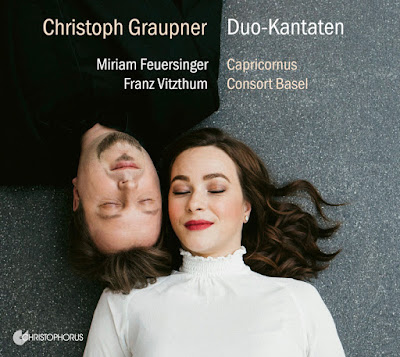This album of German Baroque
Cantatas is entitled “Herzens-Lieder” or “Songs of the Heart.” This new
release features compositions by Christoph Graupner, Johann Kuhnau,
Georg Philipp Telemann, and Johann Sebastian Bach. Austrian soprano
Miriam Feuersinger does a stunning job interpreting these “Songs
of the Heart.” She has won several awards, including an Echo award for
her 2014 recording of Graupner cantatas.
Mostrando entradas con la etiqueta Capricornus Consort Basel. Mostrar todas las entradas
Mostrando entradas con la etiqueta Capricornus Consort Basel. Mostrar todas las entradas
jueves, 27 de diciembre de 2018
martes, 2 de octubre de 2018
Miriam Feuersinger / Franz Vitzthum / Capricornus Consort Basel CHRISTOPH GRAUPNER Duo-Kantaten
It was Christoph Graupner who was selected as the Thomaskantor in
Leipzig after Johannes Kuhnau, and it was only the fact that Graupners
patron in Darmstadt did not let him go that Johann Sebastian Bach got
the job! In fact Graupner was the more famous and more modern composer
during those years, yet history almost forgot him for more than two
centuries even having composed five times as many cantatas as Bach. An
important and highly praised step in the re-discovery or Graupners music
was already presented by the soprano Miriam Feuersinger and her ECHO
Klassik awarded debut release on Christophorus together with the
Capricornus Consort Basel. She is now joined by countertenor Franz Vitzthum for a new album of duo cantatas. This is music of great depth,
with the two voices blending so well that sometimes they seem just one.
miércoles, 23 de mayo de 2018
Miriam Feuersinger / Capricornus Consort Basel CHRISTOPH GRAUPNER Himmlische Stunden, selige Zeiten
The ubiquitous presence of the Bach cantatas in posthumous reception and present-day performance practice easily obscures the fact that the Central German church music of the Baroque distinguished itself through a preponderantly different appearance. Bach’s aspiration to develop all the combinatorial possibilities and his quite problematic equalisation of orchestral compactness and vocal lines rather represent a special case that, not by chance, came into con ict with new ideals of comprehensibility and definitude.
The extensive cantata oeuvre of Christoph Graupner, only parts of which have been apprehended until now, is audibly orientated towards a different goal: to promote devotion through emotional clarity, thus gratifying the connoisseur without making undue demands on amateurs. Graupner’s music aims to grab hold of the listener without losing intellectual elegance and the composure which is a courtly public’s due. His credo of the utmost possible “Simplicität”, laid down in the preface to the Darmstadt Chorale Book in 1728, must not be misunderstood, however: Graupner’s cantatas speak a comprehensible, but thoroughly elevated and markedly intellectual language. Unlike the sovereign, easily grasped Telemann
and the often ingeniously plain Stölzel, Graupner prefers a refined elaboration with a hidden, deeper meaning that is not always easily accessible and audibly reckons with an informed interpreter. When we read in a 1781 Darmstadt testimonial about Graupner that he “linked art with nature, splendour with simplicity, charm with beauty” and thus “brought about ... edification and enjoyment”, then these were compliments from the eighteenth-century point of view to which a Sebastian Bach, for example, could hardly lay claim.
Suscribirse a:
Entradas (Atom)






